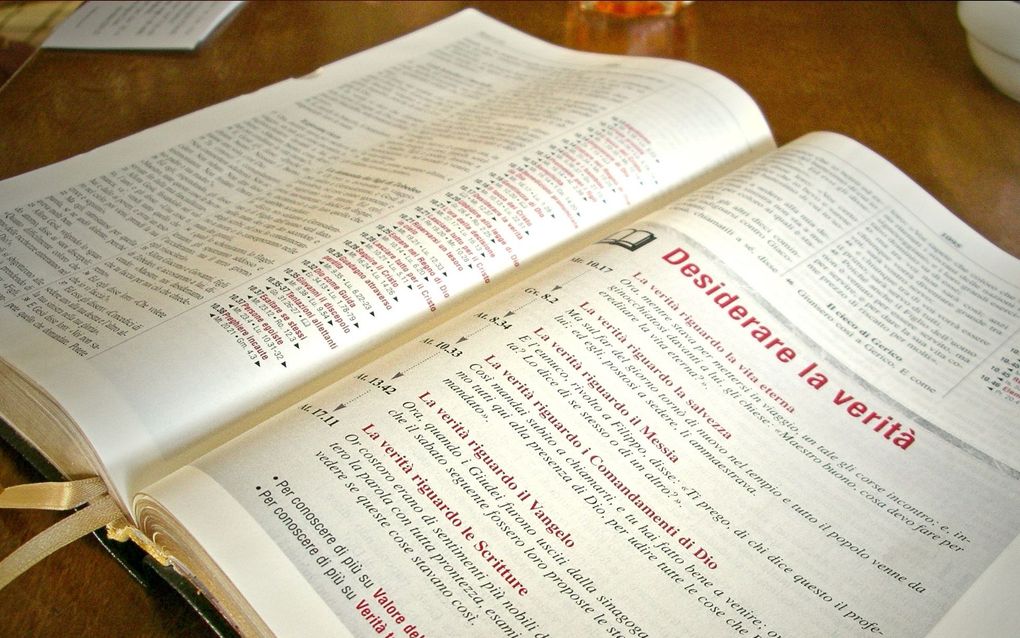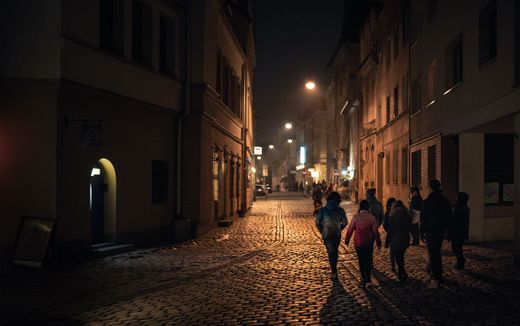Weekly column: Christian life in Italy: Challenges of Evangelicals in public debate
29-10-2021
Christian Life
Chiara Lamberti

Until 1870, the Bible was legally a controversial book in Italy. Photo Flickr, Rob Krause
Christian Life
They might consider me a bigot and closed-minded person. When I open a blank document to start writing about a topic from a Christian perspective, I almost hear the voices and criticisms of all my former university friends. I think of those who might be offended by what I am writing.
Obviously, there are no direct attacks, and no one prevents me from writing down my beliefs. That is a great blessing. We know that there are continents and countries where this freedom is not taken for granted and is often wholly suppressed.
As an Italian correspondent, however, the issue of freedom of the press, expression, and religion is very dear to me.
Chiara Lamberti (1992) was born and raised in Naples, Italy. She studied Communication Sciences and has a master's degree in Information, Publishing and Journalism. She also has a degree in theology. She writes for the Italian Evangelical Alliance and contributes to the Protestant magazine Loci Communes. With her husband and daughter she lives in Rome.
In my country, religious pluralism has never been a fully realised reality. Also, the contemporary debate suffers from this historical legacy.
This gap between Evangelicals and others dates back to the advent of the Protestant Reformation in Europe in the sixteenth century. Protestant ideas were spreading rapidly in Italy too. But then the Church of Rome, reacting strongly against the Counter-Reformation, prevented the Reformation from spreading in Italy.
Within a century, there was not a single Protestant left in Italy. The small communities that had been created were dismantled. Families who had adhered to the ideas of the Reformation were forced to emigrate or denounce their new beliefs.
A battle of censorship
Physical persecution was one of how believers were prevented from proclaiming the Gospel. But most of all, the battle was fought with censorship.
An index of forbidden books was compiled and at the top of this list was the Bible. The Word of God could not be translated into Italian. The Bible could not be sold until after the Unification of Italy in 1870. No ordinary person had the right to read it personally. Only the clergy were allowed.
All publications had to do with censorship. That was not abolished officially until 1966. This practice shaped culture by disaccustoming Italians to a plurality of thought, especially on religious matters.
Yes, the papacy lost most of its power. But it still has considerable influence on communication, the press, radio, TV, and Italian life in general. We experienced another brief time of persecution during the Fascist period. After that, the new Italian Evangelical communities formed since the 19th century were relatively free to hold their meetings and express their beliefs.
Debate between world views
However, despite this formal freedom, there continued to be a lack of genuine religious pluralism in information. Mainstream channels completely ignore religious minorities. The Italian public has never been accustomed to dealing with the subject of such groups or to hearing a debate between different world views and accepting that there are non-Catholic Italians.
With the advent of secularisation late 20th century, religion is slowly banned from the media. They consider a ‘secular’ view of the world as expected, without ever having gone through the stage of genuine pluralism.
The most glaring example can be seen in the issues concerning migrants and the right to citizenship. In the public debate, belonging to Islam or a different religion is used to discredit the possibility of being Italian.
Voice of minorities not heard
The lack of religious pluralism in the media and other fields, such as schools, is very dangerous and alarming.
Religious liberty and freedom of the press go hand in hand. As the report on freedom of the press by Reporters Without Borders (RSF) shows, countries where freedom of the media is restricted or not fully guaranteed also suffer significant problems in terms of religious freedom. The fact that the voices of religious minorities are practically non-existent in the national media flattens public debate. It does not stimulate a pluralistic and open culture.
This perspective is important because, even if there is no real persecution or limitation to the circulation of ideas in Italy and the West, new and more complicated challenges are emerging precisely in the freest and most democratic countries.
We know that the Christian faith affirms concepts and words that are very sensitive in our contemporary societies. They are increasingly considered aggressive or harmful to individual freedom. In Italy, the Evangelical debate is open to bringing together the secular vision and the voice of the Word of God, which does not change according to the community’s needs in a society not accustomed to the culture of pluralism.
What is hatred?
These days, for example, the Italian public debate is highly focused on the approval of the “Zan bill”, which was finally rejected this week by the Senate.
This bill was meant to be a new law regarding homophobia. The problem with this proposal was that it did not specify what is meant by hatred, incitement to hatred, and which words or phrases constitute a problem of discrimination. This raised the fear that even talking about sin could be considered a criminal offence by the courts.
While the discussion in the secular media was very much in favour of approval, the Evangelical world tried to clarify its position through statements and debates. Despite the fact that it sometimes struggled to find a unified voice and make itself heard.
The Christian position in the media, on the other hand, has been reduced to only the Vatican’s one. But the Catholic Church has not expressed itself from a theological vision, but by declaring, as a State, that the approval of this law was incompatible with the Concordat. The Concordat was signed with the Italian state in 1929, during the Fascist period.
Hearing the truth of the Gospel
This stance gave rise to a robust debate on state laicism. Although Evangelicals also believe that an independent theocratic state cannot intervene in the decisions of the laic Italian state, they struggle to distinguish themselves in the public debate. Their position hardly ever emerges in the mainstream media.
The issue of pluralism inherited from history results in factions that struggle to talk to each other and clash ideologically without really listening to one another.
The challenge is to get as many people as possible to hear the truth of the Gospel without imposing it as a decision of one state over another and without violating anyone’s freedom. But also to freely proclaim what the Bible teaches about sexuality, gender identity and marriage.



